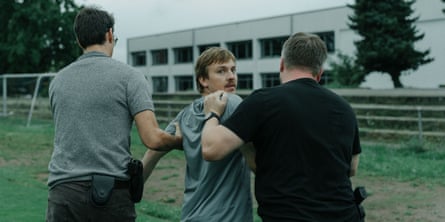It’s never a good sign, is it, to see a young woman going for a run in the woods at the start of a gritty European crime drama? The Black Forest Murders takes the real-life killing of two young women in the south of Germany as its basis, and turns it into an extremely thorough police procedural. The detective work here is complex, precise and painstaking, and there is a sense that the film-makers have no wish to spare viewers any of the intense slog it takes to track down the perpetrator (if indeed the police manage to do so).
Nina Kunzendorf is senior detective Barbara Kramer, who grew up in the area but moved to Berlin to make her name in the police force. Now that her father is getting older, and more infirm, she has moved back to her (fictional) small, rural home town in the south, where she is treated as an outsider. Kramer seems like a loner, smokes a lot and is the sort of cop who will slam down the phone when she doesn’t like what she’s hearing on the other end of it. She is your classic TV lead detective. The force at her command are local people who have remained local, and they largely resent her Berlin ways and lack of community knowhow. But she, too, is contemptuous of their amateur methods, small-town gossip and the low hum of sexism that threatens to rear its head again and again. It’s a standard culture-clash setup.
When 27-year-old Stefanie Berghoff fails to come home from a jog, it sparks an enormous search for her. Her husband, Tobias (David Richter), could only look more shifty if he started waving around a murder weapon and winking at the camera, but surprisingly, he has a rock-solid alibi. The hunt for Stefanie is complicated by the fact that the entire village has been out to help, even before the police manage to arrive in the area, which means evidence could have been trampled. Kramer is not having any of it.

Given the title, and the fact that “Murders” is not singular, it isn’t much of a spoiler to say that Stefanie’s body is discovered, and towards the end of the first episode, so is that of another young woman. Both were killed and moved a short distance, leaving “drag marks”, a small detail that I found particularly horrible. The question is whether the two cases are connected. I tend to judge dramas about the violent deaths of women by how much the camera lingers on their naked bodies during the inevitable autopsy scenes, but this is not that kind of drama. It avoids salaciousness, seemingly as a matter of principle.
In many ways, The Black Forest Murders shares a modus operandi with The Breakthrough, the Swedish procedural, also based on real-life events, that was a hit on Netflix at the start of the year. Like The Breakthrough, this has a linear and essentially straightforward narrative: crimes are committed, the police investigate, gather up all the evidence they can find, and then we get our answers. Kramer notes that it could be a long road, and tells a story about a 12-year hunt for a killer in Berlin. The drama is essentially forewarning viewers to settle in for the long haul.
So we see officers carefully combing the branches of a shrub, under a magnifying glass, in the hope that they might find a speck of something that could offer up DNA. Suspects are interviewed and eliminated, based on rough times of death, which is ascertained in Stefanie’s case through the contents of her stomach, the time that her phone stopped working and reports of screams. On the other hand, Kramer counters her own list of evidence, explaining the flaws, or the counterarguments, in the information that has been gathered. Perhaps Stefanie ate later than usual? Perhaps her phone battery died? Perhaps those who heard a scream got it wrong? Something isn’t adding up, but over the first two episodes, it’s not clear what’s wrong, or why.
The levels of precision and detail that worked in The Breakthrough’s favour are not quite as convincing here. Partly, that is because The Black Forest Murder’s tropes are familiar and well worn. There is the conflict between rural and urban, between village and city. There is the outsider looking in, who has her own past to contend with, and must relearn the local knowledge that she has lost. There is even a bit of the female boss being undermined by her male colleagues, Prime Suspect-style. Its attention to every single moving part means that the drama itself moves very slowly, and it is not so much a thriller as a satisfying puzzle, steadily coming together. Not a bad drama, then, but not a revolutionary one, either.

 3 months ago
223
3 months ago
223

















































